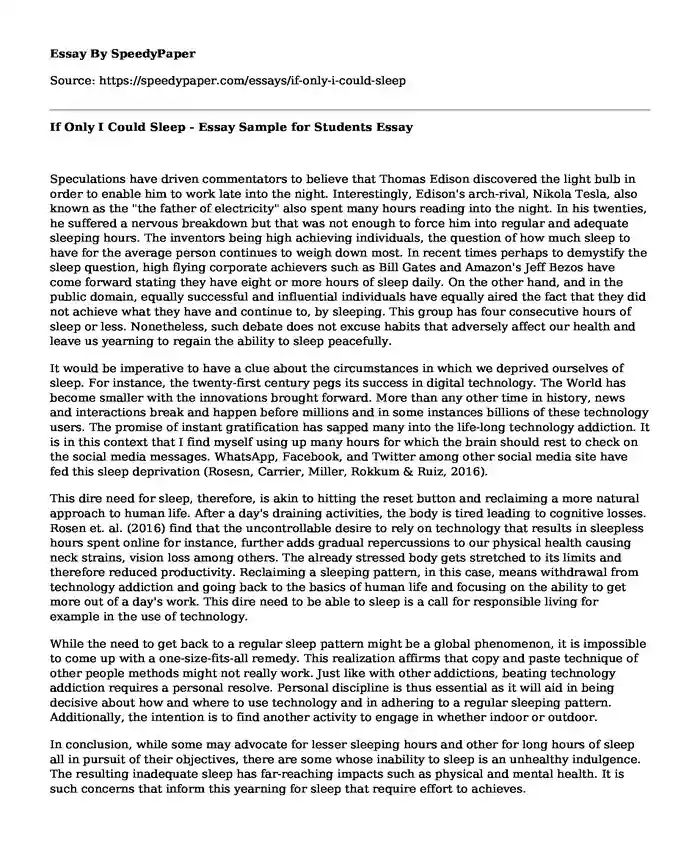
| Type of paper: | Essay |
| Categories: | Mental health |
| Pages: | 3 |
| Wordcount: | 643 words |
Speculations have driven commentators to believe that Thomas Edison discovered the light bulb in order to enable him to work late into the night. Interestingly, Edison's arch-rival, Nikola Tesla, also known as the "the father of electricity" also spent many hours reading into the night. In his twenties, he suffered a nervous breakdown but that was not enough to force him into regular and adequate sleeping hours. The inventors being high achieving individuals, the question of how much sleep to have for the average person continues to weigh down most. In recent times perhaps to demystify the sleep question, high flying corporate achievers such as Bill Gates and Amazon's Jeff Bezos have come forward stating they have eight or more hours of sleep daily. On the other hand, and in the public domain, equally successful and influential individuals have equally aired the fact that they did not achieve what they have and continue to, by sleeping. This group has four consecutive hours of sleep or less. Nonetheless, such debate does not excuse habits that adversely affect our health and leave us yearning to regain the ability to sleep peacefully.
It would be imperative to have a clue about the circumstances in which we deprived ourselves of sleep. For instance, the twenty-first century pegs its success in digital technology. The World has become smaller with the innovations brought forward. More than any other time in history, news and interactions break and happen before millions and in some instances billions of these technology users. The promise of instant gratification has sapped many into the life-long technology addiction. It is in this context that I find myself using up many hours for which the brain should rest to check on the social media messages. WhatsApp, Facebook, and Twitter among other social media site have fed this sleep deprivation (Rosesn, Carrier, Miller, Rokkum & Ruiz, 2016).
This dire need for sleep, therefore, is akin to hitting the reset button and reclaiming a more natural approach to human life. After a day's draining activities, the body is tired leading to cognitive losses. Rosen et. al. (2016) find that the uncontrollable desire to rely on technology that results in sleepless hours spent online for instance, further adds gradual repercussions to our physical health causing neck strains, vision loss among others. The already stressed body gets stretched to its limits and therefore reduced productivity. Reclaiming a sleeping pattern, in this case, means withdrawal from technology addiction and going back to the basics of human life and focusing on the ability to get more out of a day's work. This dire need to be able to sleep is a call for responsible living for example in the use of technology.
While the need to get back to a regular sleep pattern might be a global phenomenon, it is impossible to come up with a one-size-fits-all remedy. This realization affirms that copy and paste technique of other people methods might not really work. Just like with other addictions, beating technology addiction requires a personal resolve. Personal discipline is thus essential as it will aid in being decisive about how and where to use technology and in adhering to a regular sleeping pattern. Additionally, the intention is to find another activity to engage in whether indoor or outdoor.
In conclusion, while some may advocate for lesser sleeping hours and other for long hours of sleep all in pursuit of their objectives, there are some whose inability to sleep is an unhealthy indulgence. The resulting inadequate sleep has far-reaching impacts such as physical and mental health. It is such concerns that inform this yearning for sleep that require effort to achieves.
References
Rosen, L., Carrier, L., Miller, A., Rokkum, J., & Ruiz, A. (2016). Sleeping with technology: cognitive, affective, and technology usage predictors of sleep problems among college students. Sleep Health, 2(1), 49-56. doi: 10.1016/j.sleh.2015.11.003
Cite this page
If Only I Could Sleep - Essay Sample for Students. (2022, Nov 07). Retrieved from https://speedypaper.com/essays/if-only-i-could-sleep
Request Removal
If you are the original author of this essay and no longer wish to have it published on the SpeedyPaper website, please click below to request its removal:
- Education Essay Sample: Why I Deserve This Scholarship
- Reduction of Potential Waste - Free Essay in Waste Management
- Paper Example on Contrasting Attitudes on the Subject of Abortion
- Free Essay Example - Sexual Double Standards
- Tackling Trauma and Anxiety with Exposure-Based Therapy: Case Study
- Research Paper on Effects of a Minimum Wage to US Government
- Free Essay. What Deficits Do Both the Book and Talk Highlight in Regard to Women's Health?
Popular categories




